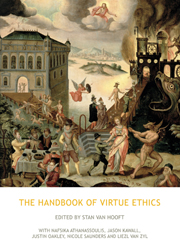Book contents
- Frontmatter
- Contents
- Acknowledgements
- 1 Introduction
- PART I NORMATIVE THEORY
- 2 Eudaimonia in contemporary virtue ethics
- 3 Stoic virtue ethics
- 4 Naturalistic virtue ethics and the new biology
- 5 Virtue ethics and moral sentimentalism
- 6 Virtue ethics and utilitarianism
- 7 Virtues and rules
- 8 Virtue ethics, virtue theory and moral theology
- 9 Nietzsche's virtue ethics
- 10 Right action and the targets of virtue
- 11 Qualified agent and agent-based virtue ethics and the problems of right action
- 12 The virtuous person and normativity
- 13 Virtue and identity
- PART II TYPES OF VIRTUES
- PART III APPLIED ETHICS
- PART IV THE PSYCHOLOGY OF VIRTUE
- Contributors
- References
- Index
8 - Virtue ethics, virtue theory and moral theology
from PART I - NORMATIVE THEORY
- Frontmatter
- Contents
- Acknowledgements
- 1 Introduction
- PART I NORMATIVE THEORY
- 2 Eudaimonia in contemporary virtue ethics
- 3 Stoic virtue ethics
- 4 Naturalistic virtue ethics and the new biology
- 5 Virtue ethics and moral sentimentalism
- 6 Virtue ethics and utilitarianism
- 7 Virtues and rules
- 8 Virtue ethics, virtue theory and moral theology
- 9 Nietzsche's virtue ethics
- 10 Right action and the targets of virtue
- 11 Qualified agent and agent-based virtue ethics and the problems of right action
- 12 The virtuous person and normativity
- 13 Virtue and identity
- PART II TYPES OF VIRTUES
- PART III APPLIED ETHICS
- PART IV THE PSYCHOLOGY OF VIRTUE
- Contributors
- References
- Index
Summary
The virtues have long played a central role in Christian moral teaching. It is not surprising, then, that over the centuries theologians have produced a number of interesting versions of an ethics of virtue. Although they hearken back to and are profoundly shaped by a shared set of canonical texts, theological commitments, and ritual observances, many of these virtue-focused accounts of ethics differ quite markedly from one another. The perfectionism of Wesley's A Plain Account of Christian Perfection is as different from the agapism of Edwards's The Nature of True Virtue as it is like it. And neither of them could easily be confused with the works of Josef Pieper, who was one of the most important contributors to twentieth-century Thomistic ethics. Given the length, breadth and sophistication of this tradition, Christian moral theology offers a wealth of resources for contemporary virtue ethicists, whether they are working within a Christian theological framework or not. This chapter will highlight four strands within recent theologically informed work on virtue ethics, each of which is directly relevant to current controversies in moral philosophy: (a) Thomistic virtue ethics, (b) narrativist virtue ethics, (c) neo-Augustinian virtue ethics and (d) divine motivation theory. Along the way it will shed light on what it means to offer a virtue ethic, as opposed to a virtue theory.
THOMISTIC VIRTUE ETHICS
The second part of Thomas Aquinas's Summa Theologiae is devoted to questions relating to ethics and comprises approximately three-fifths of the total work.
- Type
- Chapter
- Information
- The Handbook of Virtue Ethics , pp. 88 - 104Publisher: Acumen PublishingPrint publication year: 2013

